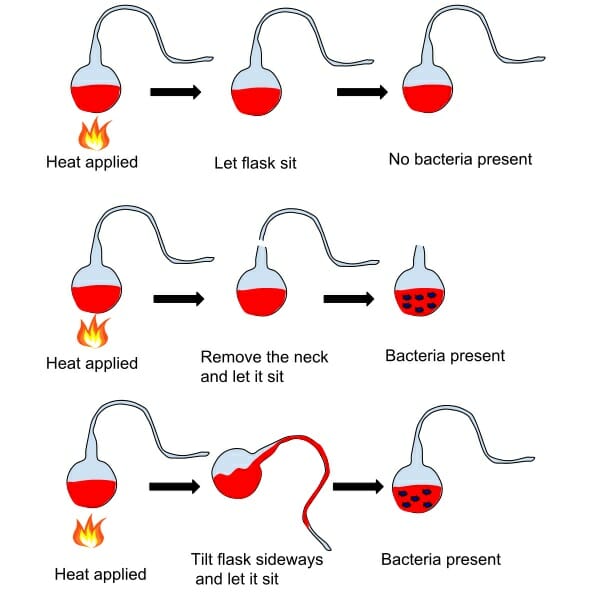Which Statement Best Describes the Germ Theory of Disease
Regarding the cell as the basic unit of life the theory argues that diseases are always caused due to germs on the outside that enter the body. The germ theory of disease also called the pathogenic theory of disease is speculation that instead of genetics being the proximal cause of many diseases that the environment plays a significant factor in the form of pathogenic microorganisms such as bacteria or viruses.

Germ Theory Vs Terrain Theory Of Health Disease Health Disease Health Quotes Motivation Health
Bastian versus the Germ Theory saysSuch germs when present would be sure to go on increasing until they brought about the death of their host Now.

. This theory was first proposed by Louis Pasteur who is famously known for cholera anthrax and rabies vaccine as well as originating the process of pasteurization. Diseases are caused by the presence and action of specific microorganisms. In most texts and sources that Ive read the germ theory of disease is stated in a form that resembles Certain diseases are caused by the invasion of the body by microorganisms.
The theory that states that microorganisms are the reason for various diseases are the germ theory of disease. The germ theory states that small organisms cause a reaction in the body of those who are infected. An outbreak of a disease occurs and a scientist at the Center for Disease Control CDC is in charge of determining the cause.
We could argue whether viruses count as microorganisms but for purposes of the germ theory of infectious diseases they do. According to the modern germ theory of disease infectious diseases are caused by the presence of pathogenic microorganisms within the body. Discuss at least two reasons why the gram stain is one of the most important stains used in the clinical microbiology lab of a hospital.
Diseases can be isolated and grown in cultures. Diseases are caused by bad-smelling poisonous vapors that contain decaying matter. Before Semmelweis puerperal fever claimed the lives of thousands of mothers and newborn babies simply because doctors did not think to wash their hands between patients but without an understanding of microbes and their ability to cause disease why would they.
The Germ theory of disease is a theory in biology. In other words the germ is that which gives rise to the development of disease. The germ theory has been questioned by some practitioners of alternative medicines who may subscribe to the belief that infections only occur when the immune system is compromised.
We only request your email address so that the person you are recommending the page to knows that you wanted them to see it and that it is not junk mail. T oday it is hard for us to fully appreciate the great revolution in medicine known as germ theory and the role that animal research played in its development. He showed putrefaction and fermentation occur due to the presence of microorganisms that grow.
Germ Theory reminds us how far infectious disease medicine has come. IN NATURE October 5 p. The theory advanced by Louis Pasteur and widely accepted in mainstream medicine that all infections are caused by microbes.
This theory was developed by Louis Pasteur through the influence of Antoine Bechamp. Germ theory in medicine the theory that certain diseases are caused by the invasion of the body by microorganisms organisms too small to be seen except through a microscope. To prevent these diseases one needs to develop a defence against the germs through vaccines and.
The thought was that the sickness passed to people through malodorous smells such as the stench of sewage or cemeteries. The Germ Theory of Disease Introduction. According to the germ theory of disease disease is caused by.
Up to 24 cash back Miasma Theory The miasma theory was popular for a very long time as a way to explain how diseases were spread. Which statement best describes the germ theory of disease. This theory is the currently accepted scientific theory about how diseases spread from one living organism to the other.
Isnt it a scientific fact that germs can cause disease. These diseases are called infectious diseases. It says that small organisms called germs also known as microbes cause some diseases.
A THEORY OF GERMS. It seems impossible that people once believed that foul odors could create disease or that evil spirits could cause a person to become ill. She is studying the microorganism that is believed to be responsible for the disease.
Thank you for your interest in spreading the word about The BMJ. This theory dates back to the Middle Ages and it influenced the clothing choices of the doctors back then. The French chemist and microbiologist Louis Pasteur the English surgeon Joseph Lister and the German physician Robert Koch are given much of the credit for development and acceptance of the.
The bodys reaction to infection is called a disease. The germ theory of disease is a theory that suggests that all types of specific infectious diseases are caused by micro-organisms called germs. Observation and questioning stage.
Explain why it was necessary to first disprove the concept of spontaneous generation before the germ theory of disease could be accepted. Diseases are created or generated spontaneously within the body.

Pin By Browsegrades Net On Academics Chamberlain College Of Nursing Microbiology Good Grades

Pin By Browsegrades Net On Academics Chamberlain College Of Nursing Microbiology Good Grades

Germ Theory Of Disease Definition History And Quiz Biology Dictionary
No comments for "Which Statement Best Describes the Germ Theory of Disease"
Post a Comment